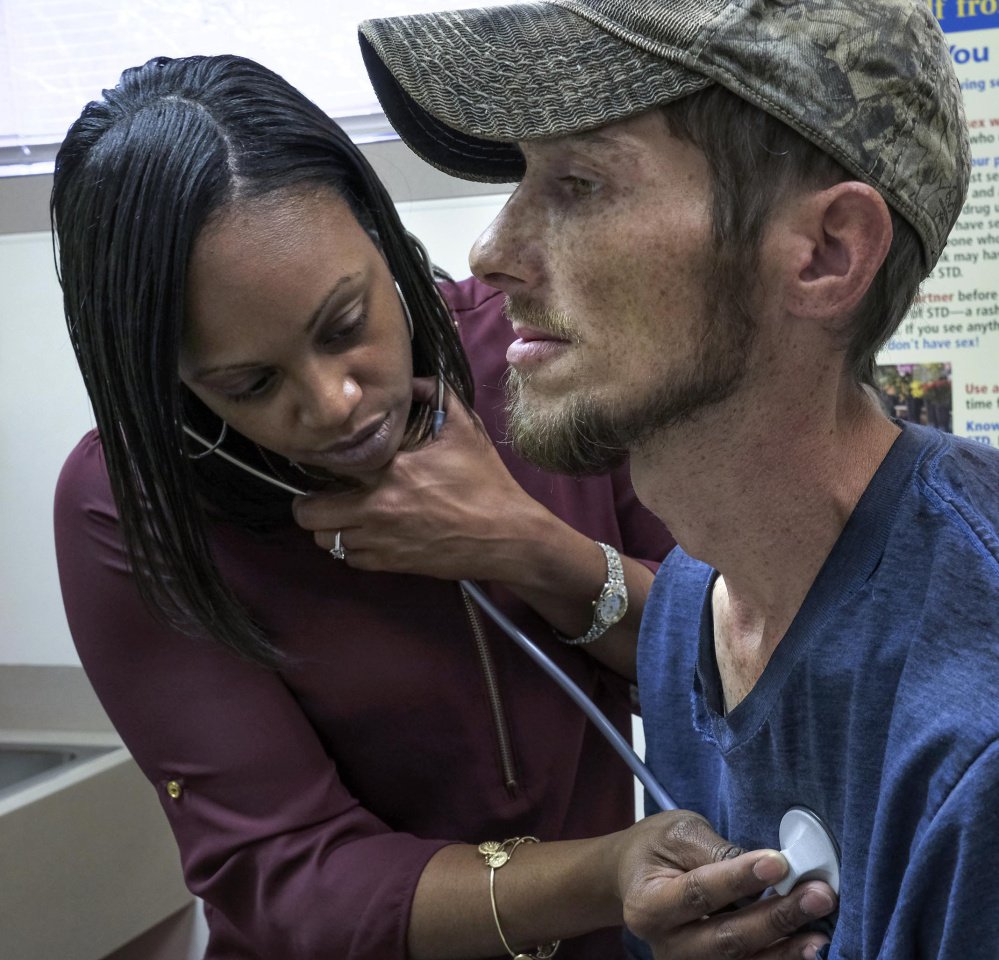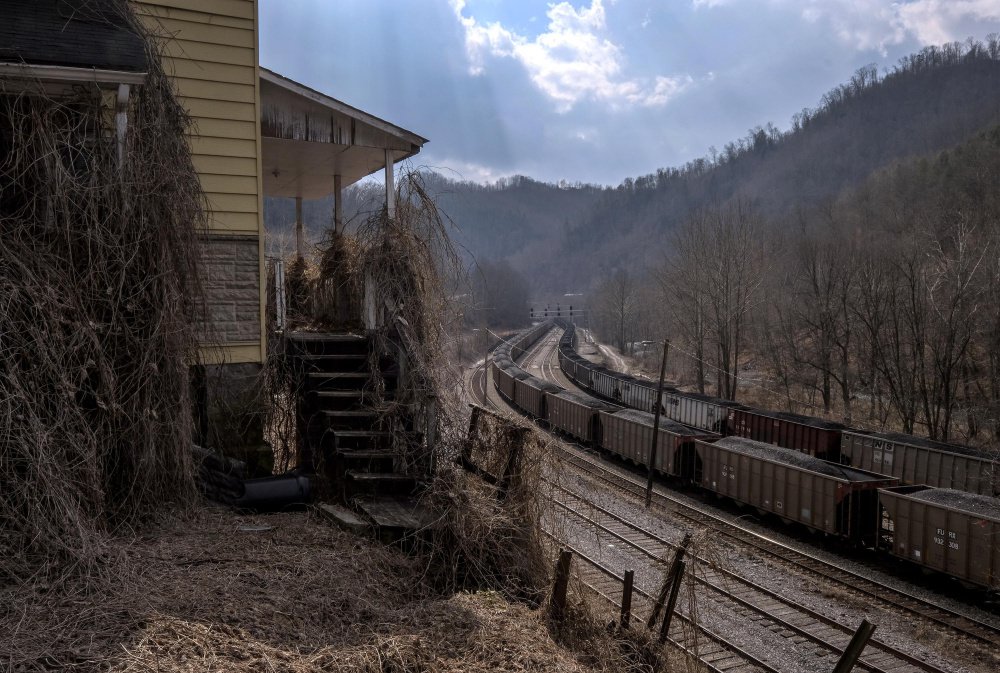NORTHFOLK, W.Va. — Another morning, another list of patients and problems in the hands of 35–year–old Keisha Saunders. Diabetes, depression, heart disease. Robert needs lower blood pressure. Buffy needs prescriptions filled. Mary needs to lose 50 pounds, so she can get what she really needs, a new hip.
Again, the list extends to the bottom of Keisha’s notepad, as it has so many days since the Affordable Care Act mandated that everyone have health insurance. Unlike in Washington, where health care is a contentious policy debate, health care where Keisha is a nurse practitioner is a daily need to be filled. The high rates of chronic diseases in McDowell County have made it the county with the shortest life expectancy in the nation.
It’s also a place that voted overwhelmingly for President Donald Trump, whose promise to repeal the ACA will soon affect nearly every patient Keisha treats at the Tug River health clinic in Northfork, including the one waiting for her in exam room No. 2.
“How are you doing?” she asks Clyde Graham, who is 54 and has been out of work for four years.
“I ate a sandwich from Arby’s,” he says. “And it jumped me out for like, three days. I mean it just burnt.”
Heartburn is just the latest problem for Clyde, a patient Keisha sees every three months. Like so many in this corner of Appalachia, he used to have a highly paid job at a coal mine. Company insurance covered all of his medical needs. Then he lost the job and ended up here, holding a cane and suffering not only from heartburn but diabetes, arthritis, diverticulitis and high blood pressure.
Because of the ACA, Clyde’s visit is covered by Medicaid. Before the law, most West Virginians without children or disabilities could not qualify for Medicaid, no matter how poor they were. The ACA – better known here as Obamacare – expanded the program to cover more people, such as Clyde, who can depend on Keisha to fix his heartburn without having to worry about the cost.
As for the other problems in his life, he has put his hopes in Trump, who came to West Virginia saying he would bring back coal and put miners back to work. When Trump mentioned repealing Obamacare, Clyde wasn’t sure what that might mean for his Medicaid. But if he had a job that provided health insurance, he reasoned, he wouldn’t need Medicaid anyway, so he voted for Trump, along with 74 percent of McDowell County.
Key word is uncertainty
Tug River Health Association treats about 8,700 patients, resulting in some 20,000 visits a year to its five clinics. In 2016, 12,284 of those visits were from patients on Medicaid, up from 5,674 in 2013, before the ACA took effect here. Without the ACA, many of those patients wouldn’t be able to afford care. Will they soon lose their coverage? Will they stop coming to the clinic? Lately, Tug River’s chief executive has been telling his staff, “The key word going forward is uncertainty.”
To Keisha, all is uncertain beyond this moment, in which she prescribes Nexium for Clyde’s heartburn, examines him from head to toe and sends him across the hall for blood work.
“I’ll see you in three months,” she says, hoping that will be true, and heads to exam room No. 1, where another patient is waiting. “What’s going on today?” she asks, and walks in the room to find out.
Depending on federal grants
Meanwhile in the front of the clinic, more patients are coming in through the heavy doors and up to a glass window where a receptionist is waiting.
“Hi honey, how are you?” Tammy McNew says to each one. Over the past four decades, McDowell County has lost 60 percent of its population, so she rarely needs to ask their names. Instead, she asks what seems like the most important question in health care these days:
“Got your insurance card with you?”
If the answer is no, she will send them back to Keisha anyway, and the clinic will depend on federal grants to make up the cost. But more often in recent years, the answer is what a middle–aged woman with springy curls says as she passes her Medicaid insurance card through the window: “Yes, ma’am,” she tells Tammy, who slides it into a scanning machine.
In other parts of the country, the primary impact of the ACA has been requiring people to have private health insurance, but in poor and sick communities like McDowell County, the law’s dominant effect has been the Medicaid expansion, which has given more people access to the kind of health care that wasn’t widely available or affordable to them before. With an insurance card in her pocket, the patient at Tammy’s window can venture into the realms of medical care that are typically out of reach to those without one: blood work, immunizations, specialized doctors, surgery, physical therapy.
If she needs mental health counseling, the clinic no longer sends her to the next county over; last July, Tug River was able to hire a psychologist, who is now treating 180 people, many of whom are trying to overcome opioid addictions.
If she needs medication, the nurses won’t go digging in a closet of samples left by drug reps as they used to do for the uninsured. The medication will come from a pharmacy and cost no more than a few dollars.
Serving the community
“All right sweetie, I got you,” Tammy tells her, and the patient retreats to a chair to wait for her name to be called. The routine is repeated dozens of times a day as the phone rings behind the front desk. “For appointments, press one,” the callers hear. “Black lung, two.”
This clinic is in Northfork, a community of a few hundred people along the railroad that carries coal through the mountains. Keisha, who is black, was raised in this predominantly white county, in a home overlooking the cinder–block church where her father, a coal miner, serves as pastor. She attended the middle school beside the clinic parking lot, which now has busted windows and gaping holes in its brick facade. There weren’t enough children to fill it, as every year the closing of more mines drove job–seekers out of the county.
Eventually, Keisha was one of them. After graduating high school and becoming a mother at 18, she realized that if she wanted to become something more for her daughter, she would have to leave.
She moved 45 minutes away, to Princeton, W.Va., where she got a nursing assistant certification and a job in a nursing home. But every Sunday, she strapped her daughter Kiana in her car and drove back to McDowell County, checking in on her always–fading town. Bulldozed, shuttered or abandoned: the grocery store, beauty salon, florist and furniture store. Still open: the dollar store, medical equipment store, funeral home and her father’s church, where Keisha would sit with her brother Derrick.
What insurance means
It was 2003 when Derrick started to feel pains in his back and groin, and Keisha, then a 22–year–old licensed practical nurse, started to understand what insurance could mean. Derrick was 24 – too old to be covered by his father’s insurance but unable to afford his own. He thought his only option was to go to an emergency room. His parents remember him returning home, having been told there was nothing wrong with him. When the pain didn’t go away, Derrick tried a different ER. Keisha would later learn that doctors thought her brother was seeking pain pills. Months passed.
All the while, a tumor grew inside his kidney. A few months after the cancer was finally discovered, Derrick died at 25.
Keisha didn’t allow herself to wonder what might have happened if he’d had insurance. She focused on remembering their last days together, when the doctors said the cancer was too advanced to be stopped, so she treated him with chocolate instead. M&Ms by his bedside.
She kept working at the nursing home and then in hospice care, raising Kiana and taking classes at night. When she was 30, she completed a graduate degree and became a nurse practitioner. She made the drive back to McDowell County again, this time to ask for a job.
At first, some patients at Tug River were wary of her loud laugh and big hoop earrings. Others had known her since she was a little girl. She cared for them all, and her schedule grew busier as the ACA came to McDowell County and made more people eligible for insurance.
In 2016, Trump yard signs and bumper stickers started appearing along her drive to work. In the clinic, one doctor and the janitor could regularly be heard rehashing the latest controversy and what they liked about Trump. Keisha had decided she would vote for Hillary Clinton, because of health care and because she wanted to see a woman become president. But it wasn’t in Keisha’s job description – or personality – to talk politics. She avoided the subject.
Come election night, she was too exhausted after another packed day at the clinic to stay awake. She didn’t learn who won until the morning.
In all of those Sundays at church, Keisha was taught that God has a plan. If God planned for Trump to win the election, she told herself that morning, it must be for a reason.
Send questions/comments to the editors.




Success. Please wait for the page to reload. If the page does not reload within 5 seconds, please refresh the page.
Enter your email and password to access comments.
Hi, to comment on stories you must . This profile is in addition to your subscription and website login.
Already have a commenting profile? .
Invalid username/password.
Please check your email to confirm and complete your registration.
Only subscribers are eligible to post comments. Please subscribe or login first for digital access. Here’s why.
Use the form below to reset your password. When you've submitted your account email, we will send an email with a reset code.